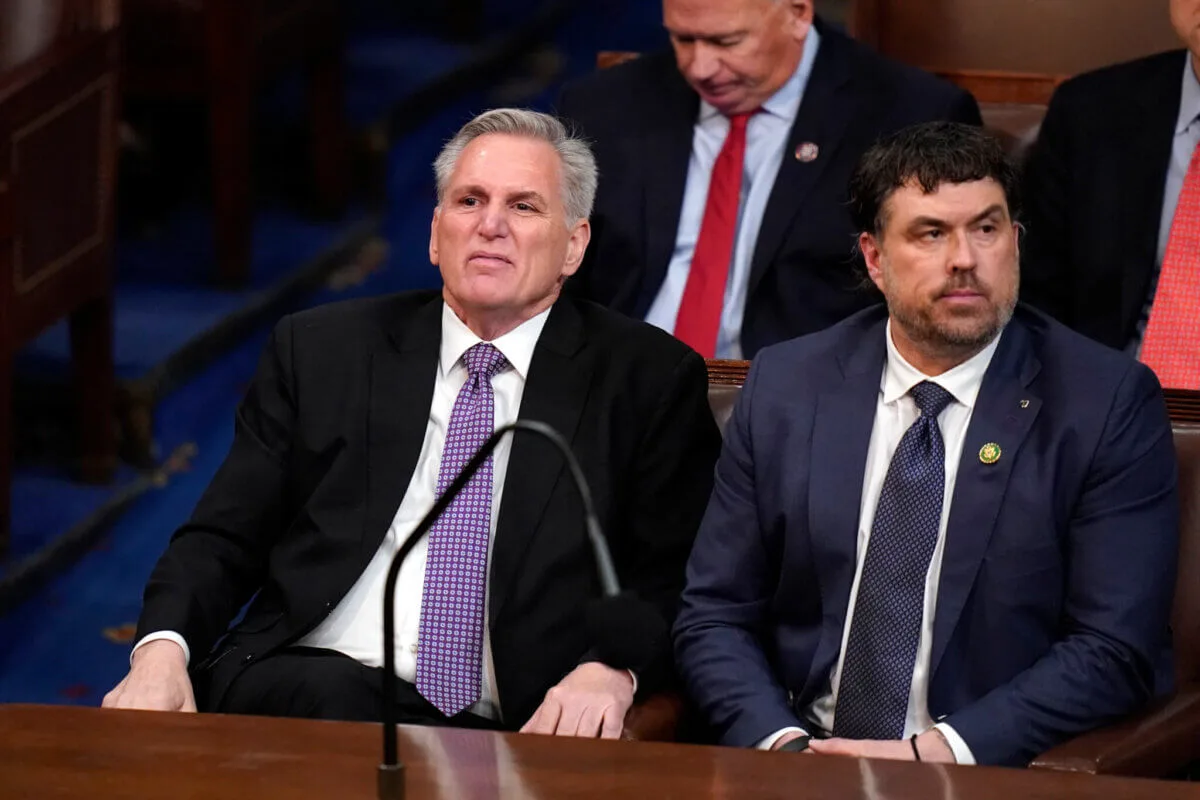
Rep. Kevin McCarthy, R-Calif., listens to the fifth round of votes in the House chamber as the House meets for a second day to elect a speaker and convene the 118th Congress in Washington, Wednesday, Jan. 4, 2023. (AP Photo/Alex Brandon)
The new Republican-controlled House has thus far failed six separate times to elect a House Speaker—the first time such a debacle has occurred since 1923. Until the new Congress elects a speaker, the House cannot assign members to committees, introduce or vote on legislation, help constituents, or even swear in members.
American voters handed Republicans a narrow House majority in November, and Republicans this week have responded by flailing and failing to elect a Speaker of the House, effectively leaving the people’s house in limbo amid their inability to govern.
Tuesday was supposed to mark the beginning of the 118th Congress, but the Republican-led House’s efforts to elect a leader devolved into chaos, bitterness, and frustration as Rep. Kevin McCarthy of California was unable to persuade enough of his Republican colleagues to elect him as House Speaker.
McCarthy, who has led the House GOP since 2019, needs 218 votes to become speaker, but repeatedly failed to reach the threshold on Tuesday and Wednesday, with 19 Republicans voting against him on the first two ballots for speaker and 20 voting against him on the third, fourth, fifth, and sixth attempts.
Among those anti-McCarthy Republicans is Pennsylvania Rep. Scott Perry, who instead has nominated Florida Rep. Byron Donalds.
Democrats, meanwhile, remained united on all six ballots, with all 212 members of their party backing their leader, Rep. Hakeem Jeffries of New York.
This week’s Republican failure comes despite nearly two months of negotiating between McCarthy and his opponents, during which the aspiring speaker has made several concessions. But none of it’s proven enough for his detractors—who some Republicans privately referred to on Tuesday as “the Taliban 19,” a comparison to the extremist, fundamentalist group that leads Afghanistan.
Following the sixth failed ballot on Wednesday, the House agreed to adjourn until 8 p.m. EST Wednesday evening, giving McCarthy and his allies time to try to negotiate with his detractors.
This may just sound like political gamesmanship, and to some extent, it is, but the showdown among Republicans also matters for Americans across the country.
Here’s everything you need to know about the battle over the next House Speaker.
What Is the House Speaker and What Do They Do?
Mandated by the Constitution, the Speaker of the House is both the leader of the chamber—presiding over the House’s legislative, administrative, and procedural functions—and their own party’s leader.
In other words, the speaker is the most powerful lawmaker in the House and has enormous power to set the policy agenda. The speaker is also second in line to succeed the president, following the vice president.
The Constitution does not require the speaker to be a House member, but every speaker thus far has been an elected House lawmaker.
How Is the House Speaker Chosen?
The speaker is elected at the beginning of each new Congress by the representatives and comes from whichever party holds a majority of the seats in Congress. To become a candidate for speaker, lawmakers must be nominated for the role by a member of their party.
Becoming the speaker requires winning a majority of the votes cast by House members. Typically, there are 435 lawmakers in the House, though resignations and deaths frequently result in vacancies. Currently, there are 434 sitting lawmakers, following the recent death of Virginia Rep. Donald McEachin.
This means that assuming all 434 representatives vote, 218 votes are needed to become speaker. That number can decrease, however, if lawmakers fail to show up to vote or decide to vote ‘present’ instead of for a certain candidate.
Why Does This Matter?
On Tuesday, the Democratic-controlled 117th Congress was formally dissolved, with the 118th GOP-led Congress convening just hours later. But until the new Congress elects a speaker, the House cannot assign members to committees, introduce or vote on legislation, help constituents, or even swear in members.
In effect, the House is currently vacant, meaning they can’t do anything they were elected to do for the American people.
Is What’s Happening This Week Common?
No. Not at all. Every House Speaker since 1923 was elected on the first ballot.
What Does This Tell Us About the Republican Party?
The House GOP’s failure to elect a speaker—the very first job of the majority party—suggests the upcoming Congress could be a disastrous one, with the Republican-led House failing to prioritize the needs of working families, such as the high cost of housing and healthcare, amid party infighting.
Republicans have previously made clear their agenda will cater to the most extreme members of their conference and base, prioritizing sham investigations and impeachments and cuts to Social Security, Medicare, and the Affordable Care Act—all while threatening to blow up the global economy if Democrats don’t let them slash benefits for working families and seniors.
Buoyed by their ascension to the House majority, the so-called “Never Kevin” faction of Republicans—a group GOP Rep. Dan Crenshaw of Texas derided as “narcissists” and “clowns”—appear to have no discernable agenda other than gumming up the works of the federal government. They’ve supported several different candidates across the six attempts to elect a speaker, suggesting they have no clear alternative to McCarthy and oppose his candidacy on principle.
The battle over House Speaker will continue, and neither McCarthy nor his detractors seems inclined to budge. McCarthy has made clear he remains determined to become speaker, while his opponents have said they’re more than happy to wait him out for as long as it takes, even if it takes weeks.
The longer Republicans continue to fight among themselves, the longer the House will remain in limbo, making it increasingly clear that the party cannot be counted on to fulfill the basic responsibilities of governance that Americans tasked them with in November.
Politics

Infrastructure funding to help repair two historic Philadelphia bridges
Philadelphia is set to receive $14.2 million from President Joe Biden’s infrastructure law to repair two historic bridges crossing the Wissahickon...

Biden cancels student loan debt for 10,800 more Pennsylvanians
The Biden administration on Friday announced its cancellation of an additional $7.4 billion in student debt for 277,000 borrowers, including 10,800...

The Republican war on Medicare raises the stakes in 2024
Nearly 3 million Pennsylvanians rely on Medicare benefits—benefits they spent decades paying into, with the promise that the program would be there...
Local News

4.8 magnitude earthquake centered in New Jersey felt across Pennsylvania Friday morning
According to the U.S. Geological Survey, the quake’s impact in Pennsylvania was primarily felt in the eastern part of the state, though the...

‘SCTV’ star Joe Flaherty, a Pittsburgh native, has died at 82
Flaherty established himself while working with Eugene Levy, Martin Short, and Catherine O’Hara on the classic Canadian sketch comedy show, and...






